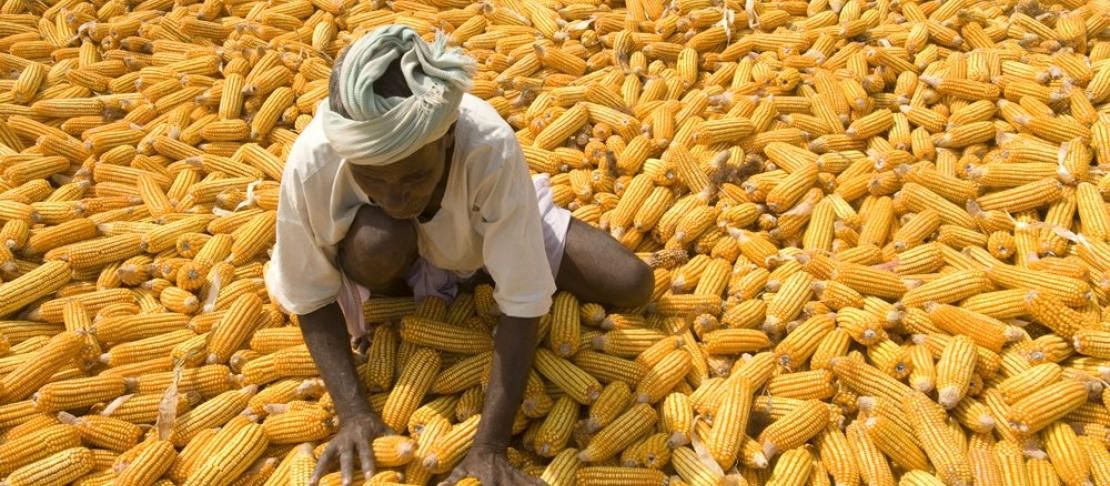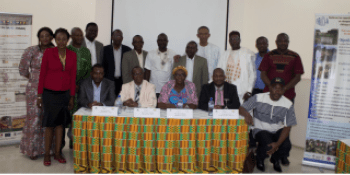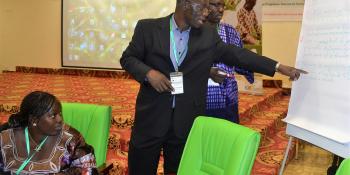Researchers get hands-on training to develop global food supply scenarios

A recently held workshop examined alternative futures for global food supply, demand, trade, prices, and food security.
The third and final IMPACT training this year was provided as part of the Global Futures and Strategic Foresight Program (GFSF), supported jointly by the Bill and Melinda Gates Foundation, CCAFS, and PIM and organized by the IFPRI’s GFSF team took place at WorldFish in Penang, Malaysia, on April 28 – May 9.
Teoh Shwu Jiau, workshop participant, WorldFish:
“The training provided a great foundation for IMPACT, covering both theoretical and hands-on exercises and rounding out our skills for applying practical scenarios”.
“IMPACT version 3 has an Excel interface, which makes it much more user friendly than the earlier version.”
This time the workshop welcomed our colleagues from the WorldFish Center, CentroInternacional de Papa (CIP), International Center for Agricultural Research in the Dry Areas (ICARDA), International Livestock Research Institute (ILRI), International Water Management Institute (IWMI), as well as collaborators from four Central Asian countries (Kazakhstan, Kyrgyzstan, Tajikistan, and Uzbekistan), 14 people in total.
The workshop was led by IFPRI’s GFSF and IMPACT experts Keith Wiebe, Daniel Mason-D’Croz, Shahnila Islam, Sherman Robinson, and Miroslav Batka.
Workshop participants were introduced to the Global Futures and Strategic Foresight project and its tools, and Keith Wiebe, Senior Research Fellow at IFPRI and leader of the PIM Research Flagship on Foresight Modeling presented an overview of Phase 1 of the project and talked about objectives and deliverables of Phase 2. Sherman Robinson also presented an overview of the recently launched IFPRI's Central Asia Research and Capacity Strengthening Program that will use IMPACT.
Following a detailed training on the use of the updated IMPACT model, the participants ran a number of different scenarios and analyzed their results. Specific focus this time was on modeling cases of new technology adoption, and participants could choose a technology most relevant to their work (for example, a colleague from CIP created a scenario for a new potato variety that would have 7 percent higher yields).
Part of the two week workshop was an open seminar on Global Futures and Strategic Foresight, presented by Keith Wiebe (IFPRI/PIM), Daniel Mason-D’Croz (IFPRI), and Nhuong Tran (WorldFish) to the WorldFish community. The seminar raised awareness and allowed those who were not part of the training to gain a general understanding of the project and its tools, and of possible complementarities with their own research.
Watch and listen to the Global Futures and Strategic Foresight presentation by Keith Wiebe, Daniel Daniel Mason-D’Croz, and Nhuong Tran.
Read the rest of this story on the Research Program on Policies, Institutions, and Markets blog.
Learn more about our work on Policy Analysis, the theme supporting the IMPACT model work.
What is IMPACT?
The IMPACT model is designed to examine alternative futures for global food supply,  demand, trade, prices, and food security. IMPACT covers 56 commodities, which account for virtually all of world food production and consumption, including all cereals, soybeans, roots and tubers, meats, milk, eggs, oils, meals, vegetables, fruits, sugar and sweeteners, and other foods in a partial equilibrium framework. It is specified as a set of 159 country-level supply and demand equations where each country model is linked to the rest of the world through trade. The basic IMPACT model is combined with the IMPACT Water Simulation Model (IWSM) in order to estimate the interactions between water supply and demand and food supply, demand, and trade. Learn more here.
demand, trade, prices, and food security. IMPACT covers 56 commodities, which account for virtually all of world food production and consumption, including all cereals, soybeans, roots and tubers, meats, milk, eggs, oils, meals, vegetables, fruits, sugar and sweeteners, and other foods in a partial equilibrium framework. It is specified as a set of 159 country-level supply and demand equations where each country model is linked to the rest of the world through trade. The basic IMPACT model is combined with the IMPACT Water Simulation Model (IWSM) in order to estimate the interactions between water supply and demand and food supply, demand, and trade. Learn more here.
Story by Evgeniya Anisimova, the Research Program on Policies, Institutions, and Markets (PIM).



